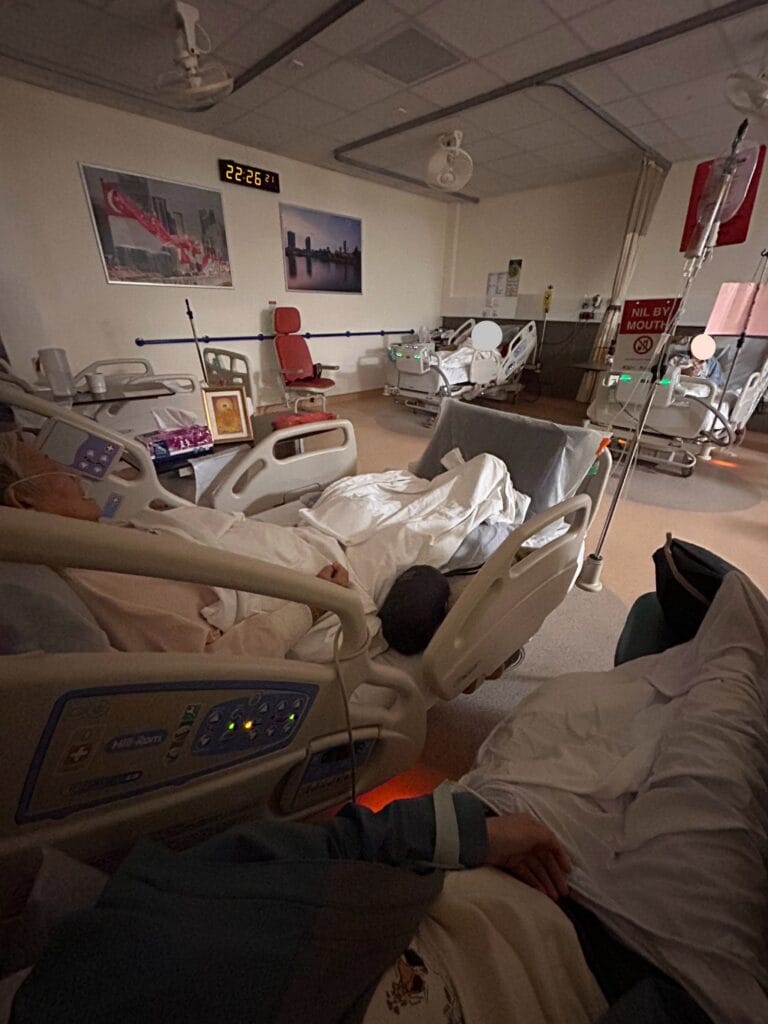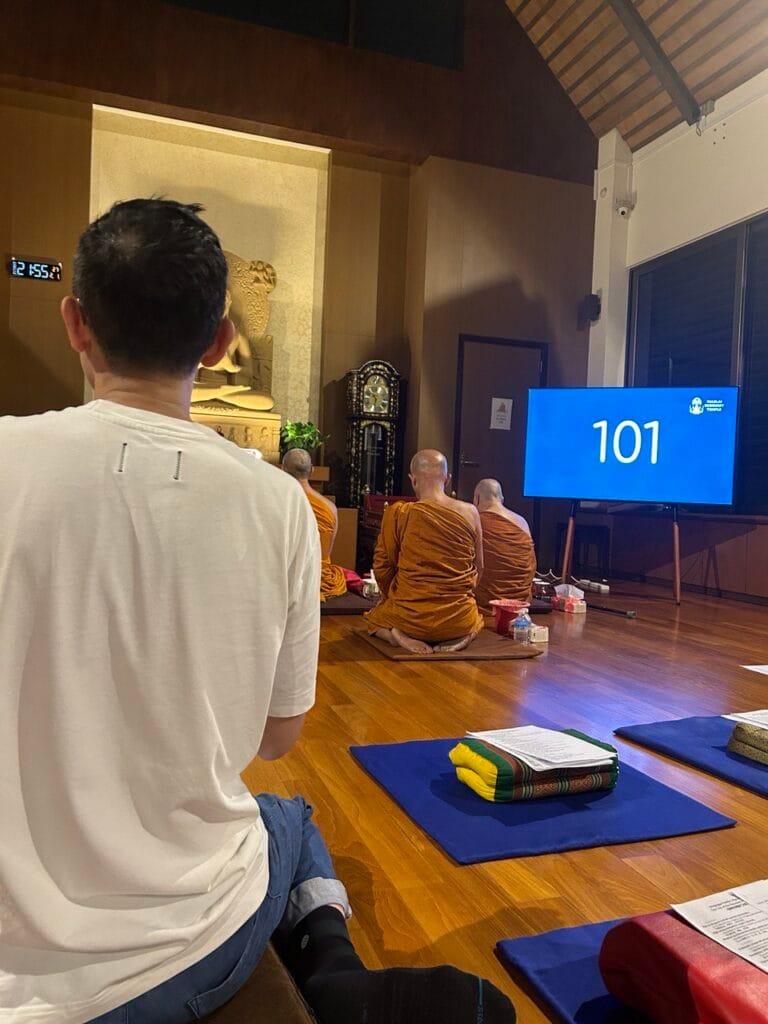TLDR: Pei Shan reflects on her grandmother’s near-death experiences, which deepened her understanding of impermanence and strengthened her Buddhist practice. Through Dhamma study and palliative care work, she reflects on how to better navigate grief, support loved ones, and find peace with mortality.
My Grandma and I: A Lesson in Impermanence
In January 2024, my grandma’s heart rate dropped to a dangerously low level, requiring her to undergo pacemaker surgery. This experience had a strong impact on me, allowing me to witness the reality of impermanence (Anicca). My grandma has always been one of my greatest pillars of support, and I was deeply saddened by the sudden realization that my time with her was limited. This awareness made me more intentional about how I spent time with her and led me to explore death, grief, and Buddhism more deeply.
Following that, I committed to more Buddhist lessons at Mahaprajna Temple, enrolled in Sister Sylvia Bay’s Dhamma Foundation courses, went on retreats, and as a whole attempted to further my Dhamma practice. In 2025, when my grandma’s health declined again, my family and I faced intense emotional challenges. I resolved to ensure her comfort and peace using the knowledge and support of the Buddhist community I had begun to surround myself with.

Wise and Practical Tips When Preparing for Death
I am deeply grateful for the support from the Sangha, who provided numerous practical tips and shared Dharma books and videos that helped me care for my grandma during these difficult times:
Prepare our Mind
When loved ones are ill, part of me always hope for their recovery. But when things don’t improve, I feel emotionally drained. This reminds me of the second noble truth—that suffering is caused by craving and attachment.
A quote by Ajahn Brahm, “You can’t always cure, but you can always care,” resonated deeply with me. It shifted my focus from expecting my grandma to recover to simply being there to care for her with compassion, regardless of her condition.
From Sister Sylvia Bay’s teachings (Buddhist death vigils), I learned the importance of establishing our minds in loving-kindness and compassion. Being a calm and comforting presence to the sick would be beneficial. Before each visit to my grandma’s ward, I would take a deep breath to center myself, ensuring I was mindful of the mental state I brought into the space.
Occasionally, when fear and anticipatory grief arose, I found comfort in Thich Nhat Hanh’s teachings in his book Reconciliation: Healing the Inner Child. I would place my hands over my heart and say “I’m here for you” with loving-kindness and compassion. These words helped me embrace and transform these strong emotions.

Chanting and Sharing Merits
Although I have been a Buddhist for many years, I was unsure which chants would be most beneficial for my sick loved ones. Some suggested the “Itipiso” chant, which reflects the qualities of the Triple Gem. I attended the 108 Itipiso chanting at Palelai Temple, using the opportunity to chant for my grandma and share merits with her. Others recommended the “Great Compassion Mantra” (大悲咒).
I learned that it’s also important to choose a chant familiar to the person. Since my grandma occasionally prays to Amitabha Buddha (阿彌陀佛), I played various versions of the chant until I found one that helped her feel calmer and relaxed. Before leaving each night, I would invite her to chant Amitabha together ten times, hoping that her last thoughts before sleep were aligned with the Triple Gem. One of my teachers gave me a photo of Amitabha, which I placed by her bedside to offer reassurance and remind her of the Buddha.
Each night, I would pray and share merits with my grandma and her kammic debtors. Many of my Kalyanamittas also kindly checked in and shared merits, and I was deeply grateful and touched by their support.

Photo credit: Ying Shan
Journey Forward in Understanding Grief and Death
Thankfully, my grandma’s condition improved, and she was moved to a community hospital while waiting for a helper. However, there were critical moments as well, where the hospital staff had to activate emergency protocols whenever she was not arousable. The first part of 2025 has definitely been an emotional rollercoaster.
Through these experiences, I’ve come to appreciate the importance of learning the Dhamma and preparing for the impermanence of life. In 2025, my goal is to deepen my understanding of grief and death, as learning more about these subjects can help alleviate the fear we often associate with them.
I reached out for recommendations on Dhamma videos and books related to death and dying, and several of my Kalyanamitta kindly provided suggestions. I also sought out opportunities for more exposure by volunteering with organizations like Ambulance Wishes, assisting with adaptive yoga in HCA hospice, and joining the Ehipassiko Chanting Group for funeral chanting. Additionally, there is a Grief Cafe, conducted monthly by Assisi Hospice, where people can share and explore their experiences with grief and loss. I was also planning to make a visit to Singapore Casket to find out more about funeral planning. This year, I made plans to work in the palliative sector to gain further understanding of death and dying through my job.
Recently, I attended my grandma’s Advanced Care Planning session, where we discussed her values and choices. It was not easy to approach end-of-life planning, especially with her mild cognitive impairment and aversion to death. However, I am grateful for this session, as she could voice her preferences to the best of her ability. Through this I was able to listen and better understand her choices.
Concluding Thoughts
This journey of facing death is certainly not easy. It has been a profound process of learning, witnessing Impermanence, and reflecting on the Four Noble Truths. Through this journey, it made me realize my attachments to my loved ones and reminded me to focus on things that are within my control. I am grateful for the wisdom and support of the Triple Gem, which has provided me a sense of peace and grounding, even in the face of loss. I hope this exploration of death and dying will inspire people to reflect on death and consider what truly matters in their lives, enabling them to live well and die peacefully.
Wise Steps:
- Contemplate on death and impermanence – Deepen your understanding through Dharma study, initiate conversations on end-of-life planning with family and friends and explore volunteering in the palliative care sector.
- Seek support from the Sangha – Don’t hesitate to reach out to your spiritual community for guidance, comfort, and practical advice during difficult times.
- For the loved ones who are still around, don’t avoid the topic of death. Instead, find the courage to discuss it with empathy and compassion, rather than allowing unspoken worries to linger in the background


